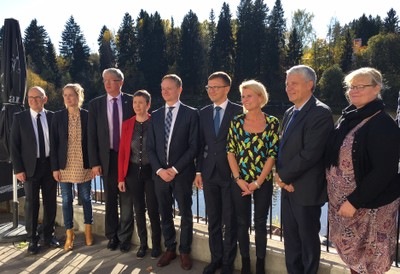"There is a group of countries which have done remarkably well in the face of the challenges to our modern, democratic societies. Their search for ideas does not cease. Denmark, Finland, Iceland, Norway and Sweden are an endless source of inspiration. They might just hold the clues to solving the security, social, political, environmental and technological threats and challenges of the 21st century. These seemingly small countries have been pouring out ideas as well as practical solutions for the last fifty years."
This is an excerpt from the foreword of the book "Nordic Ways" wich was published at the beginning of October on the initiative of Andràs Simonyi, Managing Director of SAIS at Johns Hopkins University. As Secretary General of the Nordic Council of Ministers, I am delighted by this initiative to build a bridge of better understanding between the Nordic Region and the US.
The Nordic Council of Ministers provided some of the bricks for the construction of this bridge. It was a logical decision; in the Nordic countries - and within the framework of the Nordic cooperation that I represent - we are keen on building bridges within the region as well as internationally.
The raison d'être of the Nordic Council of Ministers is to establish, develop and deepen cooperation; to build bridges and facilitate avenues of collaboration that create added value for all parties included.
We have been doing this since our establishment in 1971 with a focus on developing five countries and three autonomous areas into a sustainable and integrated region. Our work is not finished, but we now have the experience and success stories that enable us to look beyond our own region and focus on more profound international cooperation. After all, we do live in a globalized world.
The growing interest of the US and the rest of the world that we are experiencing is a catalyst for our international activities. In the US this has been most vividly seen in the presidential campaign, where the social models of the Nordic countries have been up for discussion. For us this attention is inspiring, and of course flattering.
However, we do not always recognize all the images portrayed in the US of the Nordic countries. That is why I am happy that "Nordic Ways" will shed a light on the Nordic Region to an American audience.
The book tells about the similarities and differences in the Nordic countries. It tells about our strategic position in the European and transatlantic cooperation and the strong historical ties to the USA. It reflects the myth about the Nordic countries as "socialistic utopias" but tells the truth about liberal democracies and capitalistic systems with a heart. It tells about 200 years of peace and prosperity, but at the same time emphasizes that we cannot take this for granted. And, finally, it tells about Nordic values - some of which are trust, openness, equality and creativity.
Somewhere in the book it is stipulated - in my translation - that "values rather than ideology are our navigating light; that pragmatism rather than orthodoxy is our best guidance" in the question and quest for what works.
It is my hope that Americans eager to take a closer look at the Nordic region and our way of life will take time to read the book "Nordic Ways", in order to better understand the Nordic model which embraces both the liberty of the individual, and the need for a fair, open, and equal society.

